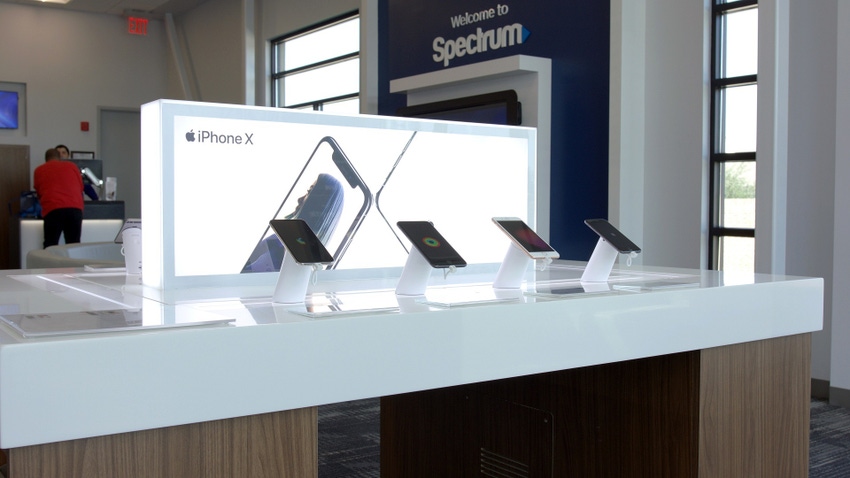Charter: 11% of broadband base taking Spectrum Mobile
Charter added 648,000 mobile lines in Q2, raising the total to 6.62 million. Charter expects mobile churn to be a non-issue as subs start to roll off the Spectrum One promo this fall.

Charter Communications' base of mobile lines exploded again in the second quarter as the operator raked in another 648,000 lines in the period – not far from the record 686,000 lines it added in the prior quarter.
Q2's take extended Charter's mobile base to 6.62 million lines, with more than 11% of Charter's broadband customers now taking mobile service from the company. "We expect mobile penetration to meaningfully grow over the next several years," Charter CEO Chris Winfrey said on today's Q2 earnings call.
Charter mobile revenues reached $539 million, up from $415 million in the year-ago quarter.
The majority of new mobile lines are coming from Charter's existing broadband customers. However, the percentage of lines coming from new customers is on the rise, and was higher in Q2 than it was in Q1, Charter CFO Jessica Fischer said.
A portion of Charter's mobile line growth comes from Spectrum One, a promotional service convergence offer introduced last fall that combines the operator's home broadband, Wi-Fi and mobile services and, in some cases, bundles in a free line of mobile. Charter's 12-month promotional pricing for that package starts at $49.99 per month.
"Spectrum One is performing well in the marketplace," Winfrey said.
Spectrum One promotional roll-off approaches
But Charter is starting to face questions about mobile churn as some customers start to roll off of the Spectrum One promotion in early October. Charter execs are confident that most of those customers will stick around after the promotion lapses and that any resulting churn will be immaterial.
"These are really good customers," Winfrey said. "I don't see any reason we'll have difficulty managing through those roll-offs ... I think we've found something that sticks."
He also allowed that Spectrum One will evolve and won't necessarily become Charter's permanent promo for fixed/mobile convergence. "We'll continue to try things in the marketplace, because I think we have a technology and a structure and capability that none of our competitors can really replicate in the marketplace," Winfrey said.
Winfrey also downplayed questions about the long-term durability of Charter's MVNO pact with Verizon. "We have a very good, strategic, perpetual MVNO relationship with Verizon and the economics ... are very good," he said.
Meanwhile, Charter will continue to offload traffic on its Wi-Fi network and pursue the use of CBRS in high-usage areas.
"I would never say never – we'll always take a look at things as they come up, but we haven't felt the need to be in the macrocell tower construction, densification and spectrum acquisition business at scale," he said.
Small broadband gain
Switching to home broadband, Charter added 77,000 broadband customers (70,000 residential and 7,000 business), for a total of 30.58 million. Internet revenues hit $5.73 billion, up from $5.56 billion in the year-ago quarter.
Charter's residential broadband average revenue per user (ARPU) of $67.02 grew 2.2%, about half of the 4.5% ARPU growth Comcast posted in the quarter, MoffettNathanson analyst Craig Moffett pointed out in a research note today. Analysts are keeping close tabs on ARPU as it becomes an increasingly important metric in evaluating cable's broadband business.
"To some extent, their [Charter's] slower ARPU growth is a predictable consequence of the breakneck growth driven by their Spectrum One wireless-and-broadband bundled pricing," Moffett explained.
Charter basically held its own in the quarter. But the company continues to see "some impact from fixed wireless access competitors in the price-sensitive customer segments of residential and SMB [small and midsized business]," Fischer said.
The company made progress on its subsidized rural broadband projects. Charter added 68,000 passings in the quarter, and added 25,000 customers via those projects with a penetration rate of 32.5%. Capex related to those projects reached $541 million, up from $391 million in the prior quarter.
Charter expects to build 300,000 new subsidized rural passings in 2023.
Execs reiterated Charter's plan to be a key participant in the $42.45 billion Broadband Equity Access and Deployment (BEAD) program. The company hopes to win "significant" funding through the bidding process, Winfrey said.
“Although the rules and recommendations from NTIA on BEAD funding differ from successful programs currently deployed by the states in which we operate, we'll work with key stakeholders and government officials to reach a place where the rules are still conducive to private investment,” he said.
Related posts:
— Jeff Baumgartner, Senior Editor, Light Reading
About the Author(s)
You May Also Like












